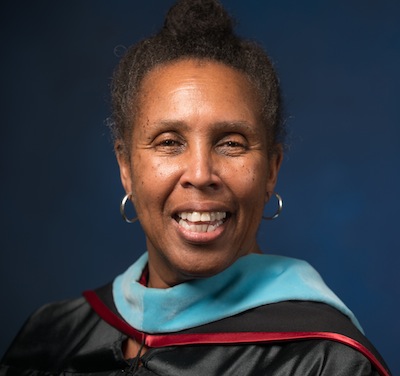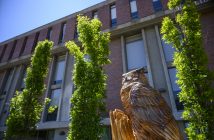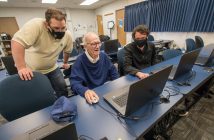Leadership. Scholarship. These tenets are central to the Urban Education Program that this year is celebrating 45 years supporting a diverse group of over 2,000 students.
Urban Education was founded in 1968 with a primary focus of recruitment and retention of first-generation students in need of financial aid. These students came from diverse educational, linguistic, ethnic and cultural backgrounds, and the program was designed to provide them with academic and personal counseling throughout their Westfield State experience.
Joan E. Fuller ’76, the director and an alumna of the Urban Education Program, says, “I have been so blessed to be a part of its evolution.”
Fuller’s experience with the program began in 1972, when she was a student at Commerce High School in Springfield. A fellow student got her interested in attending an informational event about the University program, and after that, “My friends and I piled into a little car and drove to Westfield State together for our interviews,” she remembers fondly.
Now, the program boasts 45 years of reaching out to high school students throughout the state. “When students are supported, their academic achievement is limitless,” says Fuller. “We seek to develop leadership skills and abilities.”
Urban Education begins the summer before a student’s freshman year. The five-week residential Bridge Program provides structured workshops and seminars designed to help students transition to higher education, with an emphasis on leadership, career and individual development.
The bridge experience includes intensive academic instruction and leadership development through peer mentorship. The concept of civic responsibility and networking opportunities is introduced by Urban Education staff, alumni and student leaders.
Basic offerings of the program include course work with a strong emphasis on research methods, expository writing, time management, critical thinking and analytical skills; structured workshops on computer applications, hardware and basic programming; tutoring in all areas of the University curriculum; personal, academic and career counseling; and financial aid assistance.
After the Bridge Program comes proactive ongoing academic and personal support by Urban Education staff. The importance of civic responsibility, networking, critical thinking and career development is also reinforced throughout students’ entire Westfield State experience.
Fuller says Urban Education’s greatest strengths are providing opportunities to learn and grow in a university atmosphere that is sensitive to the wide range of obstacles that confront ethnically and educationally diverse students.
“We also have a strong peer advising component to the program,” says Fuller. “Between our peer counselors and active alumni, our students are capable of reaching their goals.”
One alumna of the Urban Education Program, Azanda Howard Seymour ’92, was recently promoted to interim assistant to the president of Westfield State. “Once I got here and made connections with the staff and my peers, I knew I couldn’t get that anywhere else,” she says. “Urban Ed was special.”
Seymour got to experience the support of the Urban Education peer counselors, who work hard to assist their fellow students. “The upper-class students gave me advice on how to select my courses, manage my time and where to find internship and job opportunities, and they were always available for advice,” says Seymour, who will soon defend her Ph.D. dissertation.
“I built relationships at Westfield State, and I could not have made it without them. They all played an integral role to get me where I am today, and I am so grateful for the guidance and support,” says Seymour.
Another alumnus, Angel L. Reyes ’81, received his primary and secondary education in the Springfield public school system and completed the Bridge Program in the summer of 1986.
“I still did not ‘get it’ and was on academic probation the second semester of my freshman year,” he says. “I did a little soul-searching, got my priorities in perspective and got back on track.”
In his junior year, Reyes took a leave from Westfield State to enter the Springfield Police Academy and returned upon completion, realizing “how important a college education really was.”
He joined the campus community in many capacities, including as a part-time counselor, instructor and summer Bridge Program residential hall director. He graduated in 1991 with a bachelor’s degree in criminal justice, and in 1995, he graduated from Western New England College with a master’s degree in criminal justice administration.
Reyes has served as an officer in the Springfield Police Department for 26 years. He is currently assigned to the Youth Aid Bureau at the Joseph Budd Assessment Center as an investigator.
He was recently appointed by Gov. Deval Patrick to serve on the board for the Wilbraham Housing Authority until 2018, and he also gives back to the community by working for Clinical & Support Options as an instructor for the Disturbing Lawful Assembly Program. He helps troubled youth by teaching them to make better choices and select positive solutions instead of reacting with negative behavior.
Reyes, in fact, embodies the Urban Education mantra: “Each one, teach one. Each one, reach one.”
“I had many obstacles to overcome that seemed unconquerable,” says Reyes, “but with the support of my family members, friends and Ms. Joan E. Fuller, ’76 I am thankful to all that have helped me achieve my goals and give back to my community.”




